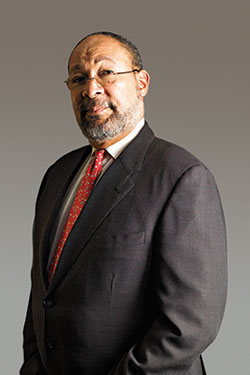
Can someone get Richard Parsons a proper drink? “I should have asked for a double,” he says, regarding the miniature glass of Moscato in front of him. He cranes his head and beckons the waitress, who whisks it away. “I should have asked for a triple,” he says, when she returns with the glass only moderately fuller. “Ah, there you go,” he says, when the bottle is brandished. “Just make it look respectable.”
It’s only 2 p.m., but what does Richard Parsons care? He’s retired. The onetime CEO of Time Warner and chairman of Citigroup no longer has to figure out ways to bring those struggling old institutions into the future. But because New York businessmen of his ilk never truly go out of commission, Parsons has lately turned his attention to reviving something else: Minton’s Playhouse, the famous jazz club below the former Cecil Hotel on West 118th Street in Harlem, where Dizzy Gillespie invented bebop and Thelonious Monk once had a steady gig as the house pianist. “It’s an historic place,” Parsons booms, gesturing at the photographs of musicians that line the venue’s walls. “All these guys—Charlie Parker, Miles Davis, Count Basie—they all played here.” As a teenager, Parsons, who grew up in Brooklyn and Queens (“But I was conceived in Harlem,” he says) used to come to Minton’s on dates. “It was my first real grown-up experience,” he reminisces, as the house band behind him plays old jazz standards. “I always thought one day I’d love to own a jazz supper club where there was good music, nice ambience, and good food.”
His nostalgia only goes so far. When Parsons and his partner, the chef–cum–opera singer Alexander Smalls, opened the club last month, it was after a gut renovation. The crooked neon sign outside was gone; the well-worn floorboards were replaced with nothing-special contemporary décor. “We didn’t want it to be a museum,” Parsons says. The only thing left was the mural on the back wall, which shows a band warming up in a greenroom. “The rumor was that’s Billie Holiday.” He points to the figure of a woman facedown on the bed, her seamed stockings askew. “Resting.”
When Parsons came back to New York after law school in the early seventies, “the entertainment scene, all of that, was gone,” he recalls. “It was on the decline when I left, but when I came back, they’d hit the nadir—is that the bottom of the hill?” He opens up a back door leading to the Cecil, the “neighborhood restaurant” he and Smalls opened in the adjacent storefront. “Like everything else in Harlem, the hotel upstairs sort of burned up in the mid-seventies,” he says, walking briskly through the row of red-leather banquettes. The city took over the building and turned the hotel into an SRO, which it still is. In the Cecil, groups of what look like medical students are digging into plates of Afro-American-Asian cuisine. “Harlem is now really kind of experiencing its second renaissance,” Parsons says. “It’s coming up after a long winter’s sleep. But this time it’s different. The renaissance of the twenties was intellectual. This is a commercial one.”
As evidenced by the real-estate prices. Before finding this space, he and Smalls looked at a pair of townhouses on 125th Street. “Ten years ago, they would have gone for half a million for the two of them, and I know,” says Parsons, who was chairman of an upper Manhattan development corporation. “We offered $3.8 million”—and didn’t get it. Apparently, even our homegrown plutocrats are being priced out of Manhattan. Parsons pushes the door to the kitchen open like he owns the place, and the chef skitters out from behind the line to salaam. He may be a man of leisure these days, but Parsons still retains the air of a powerful CEO. His leonine face is friendly, but he is large and imposing in a way that suggests he could, if not have you killed, at least make your taxes a nightmare. He is decidedly an Inside animal, who got his start working for the Rockefellers, campaigned for Giuliani, and served on the transition team for Mayor Bloomberg.
Unlike his peers, he doesn’t share the apocalyptic vision of incoming mayor Bill de Blasio. “No, I don’t think he is going to burn the city to the ground,” he says. “Obviously, a lot of his campaign resonated with people, and the reason was because what he said was true.” A good illustration of De Blasio’s “two New Yorks” message is Minton’s, which serves both those who can afford the $90 minimum for dinner on Saturday night and the occupants of the SRO upstairs, who come down for free meals on Saturday afternoons. “When I was a kid, there was a whole middle class here,” he reminisces. “Now the middle class, they are getting squeezed out.”
Again Parsons’s nostalgia for the good old days has limits. The band breaks, and the bow-tie-clad bass player stops by to shake Parsons’s hand. The band members were culled from the Jazz Foundation of America. “They’re all over 70, and they don’t have pensions,” he said. “So I thought, Wouldn’t it be great to put some people back to work?”
“He did a great thing,” the bass player says earnestly. After he leaves, I mention it’s like something the club’s original owner, Henry Minton, might have done—he was known for giving generous loans to struggling musicians. Parsons recoils. “I ain’t giving anybody any loans,” he says. “Like I said, this isn’t a museum.”
Have good intel? Send tips to intel@nymag.com.